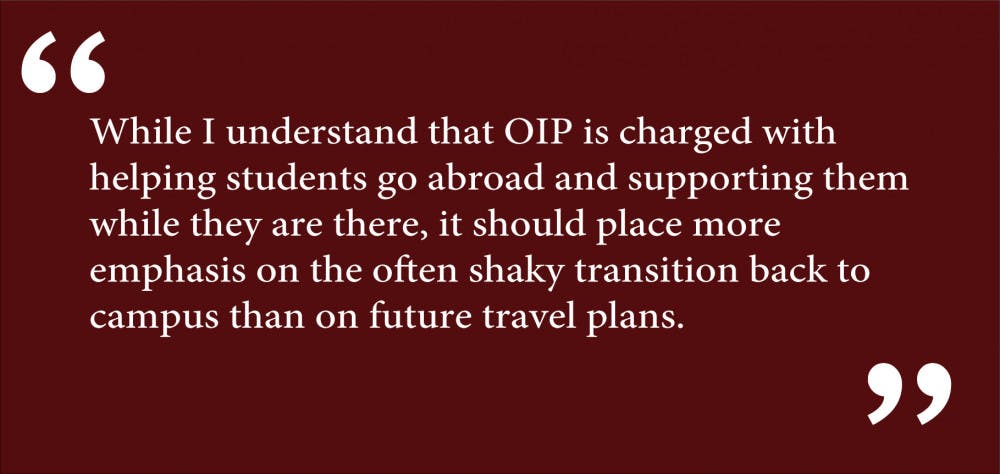When I returned back to campus this semester after studying abroad, I felt like I was entering a second freshman year. Thayer Street had completely transformed, the dining halls had changed and everywhere I looked, the unfamiliar faces of new students replaced those of the upperclassmen who had long graduated. I felt lost and out of place, not to mention shell-shocked by the workload and responsibilities I had once been so used to. To say it was a difficult adjustment would be an understatement. But my experience was not unique: many students face similar challenges re-adapting to life at Brown after a semester abroad.
Some of these obstacles — particularly social and academic ones — are unavoidable, as they come with the territory of shifting between countries and schools. But others can certainly be reduced, especially when the impediments are purely logistical. Take issues with student housing after going abroad in the fall, for example, or the lengthy period of transcript processing. These are small-scale but time-consuming burdens that can exacerbate the difficult adjustment. Another problem is the automatic meal plan cancellation after study abroad, which forces students to visit the Dining Services office in person to reverse the cancellation when they arrive back on campus. This may also seem like a minor inconvenience, but it has larger implications: It means that, if students study abroad in the spring, the financial aid they calculate for the following year will not include the costs of their meal plans. Procedural issues like these are far too common, and can create unnecessary financial and academic pressures for returning students.
After years of sending students abroad, shouldn’t Brown be more prepared to deal with these issues in an efficient manner? Students have enough trouble re-adapting to Brown’s course load and combatting culture shock after they come back from a study abroad program, so why give them more to worry about?
Instead of addressing this issue, the Office of International Programs focuses its energy on convincing students to go abroad — sometimes even for a second time. When I browsed through the “Returning Students” page on the OIP’s website for more information, I was struck by the fact that it states, “you could be traveling again before you know it.” By contrast, not a lot of information was offered about re-adjusting back to Brown and the United States. While I understand that the OIP is charged with helping students go abroad and supporting them while they are there, it should place more emphasis on the often shaky transition back to campus than on future travel plans.
To be fair, the OIP does make an effort to mitigate these problems by hosting a returned students reception lunch as a space for students to share their experiences and discuss their transitions back to Brown. The OIP also provides students with information about credit transfers and encourages them to reach out to CareerLAB to find out how to leverage their study abroad experiences on a professional level. These are all helpful services, but do not provide support to overcome the logistical hassles of returning. Brown should consider making a few organizational changes to streamline the process and best serve students returning back to campus after time away.
First of all, the University needs to eradicate the disconnect between the OIP and Dining Services. Simply adding a section about the meal plan cancellation policy to the OIP site and sending out an email to students with this information before the financial aid deadline would make a world of difference for those calculating financial aid and budget needs. The housing issues that come with study abroad could also be easily avoided with a little extra coordination. The OIP has access to the names of all the students who are abroad and those who will be going abroad the following semester. By putting these students in touch with each other and collaborating with the Office of Residential Life, the OIP could easily facilitate housing swaps between returning and leaving students — of course, only if students consent to having their names shared. This would allow students to learn of available rooms and choose ones that best fit their needs, rather than entering the random — and generally disappointing — housing selection process. More frequent events and academic peer support for students transitioning back to Brown’s academic structure could also help.
But most importantly, Brown and the OIP should consolidate the different services that cater to returning students. They can start by integrating information from Dining Services and ResLife into their website and alerts. If students can find all of their information in one place — or even in one email — it would be a much simpler process. This may go beyond the OIP’s stated responsibility of “manag(ing) study abroad opportunities” — but that in itself is the underlying issue. The OIP needs to recognize that the transition back to Brown is just as important as the preparation process, and take some responsibility for the student’s safe and healthy welcome back. The study abroad experience does not end when you step foot back on Brown’s campus. It is an ongoing process that requires patience, adaptation and a solid support system. If the OIP does not provide that support, then who will?
Samantha Savello ’18 can be reached at samantha_savello@brown.edu. Please send responses to this opinion to letters@browndailyherald.com and other op-eds to opinions@browndailyherald.com.



